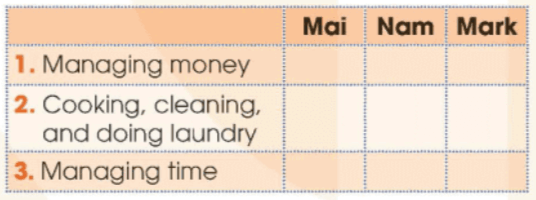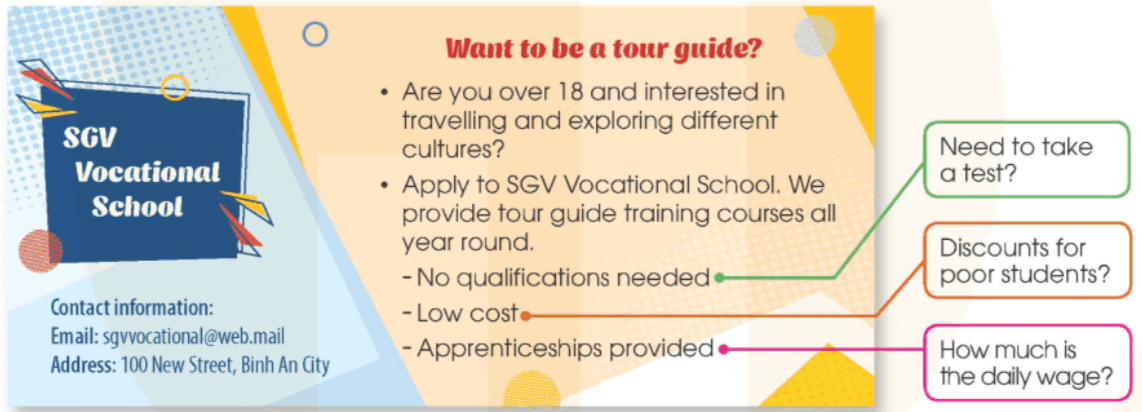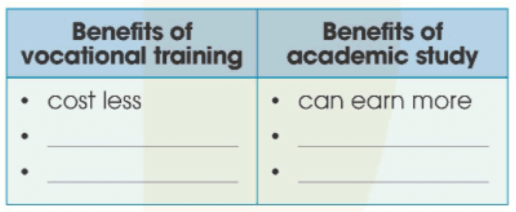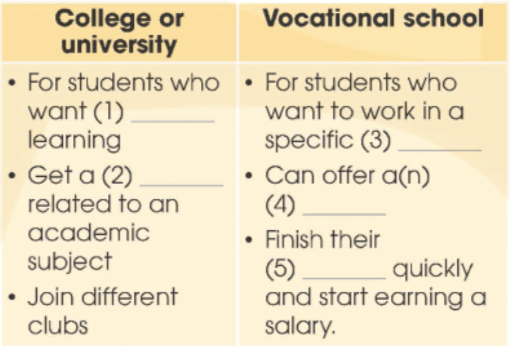Listen and pay attention to the fall-rise intonation in the following sentences. Then practise saying them in pairs. (Lắng nghe và chú ý đến ngữ điệu tăng giảm trong các câu sau. Sau đó thực hành nói chúng theo cặp)
Bài nghe:
1. Shall we now talk about other learning methods?
2. Could you please pay attention when I’m talking to you?
3. Why don't we use public transport to go to school?
4. Would you like to join our cooking Course?
Giải Tiếng anh Unit 8 lớp 11 Language (trang 87, 88, 89) - Global success
Pronunciation
Listen and repeat. Pay attention to the fall-rise intonation in the following sentences. (Lắng nghe và lặp lại. Hãy chú ý đến ngữ điệu lên xuống trong các câu sau)
Bài nghe:
1. Would you like a cup of tea?
2. Why don‘t you answer your phone?
3. Would you like me to help you install the soltware?
4. Can you show me the money-management app you told me about?
Giải Tiếng anh Unit 8 lớp 11 Language (trang 87, 88, 89) - Global success
Match the two halves to make sentences used in 1. (Nối hai nửa để tạo câu được sử dụng trong 1)
|
1. It’s my mum |
a. that took a long time |
|
2. It was earning my parents’ trust |
b. who still think I don’t have the skills to be independent. |
|
3. It’s my parents |
c. that taught me how to be responsible with money |
|
4. It’s the app |
d. who’s calling me again |
Giải Tiếng anh Unit 8 lớp 11 Getting Started (trang 86, 87) - Global success
Find words and a phrase in 1 that have the following meanings. (Tìm các từ và một cụm từ bài 1 có các nghĩa sau)
1. a belief in your own ability to do things well
2. confident and free to do things without help from other people
3. things that you must do as part of your duty or job
4. the activity of planning how to spend and save money
Giải Tiếng anh Unit 8 lớp 11 Getting Started (trang 86, 87) - Global success
Read the conversation again and decide who has these skills. Put a tick (v) in the correct column. (Đọc đoạn hội thoại một lần nữa và quyết định xem ai có những kỹ năng này. Đánh dấu (v) vào cột đúng)
Giải Tiếng anh Unit 8 lớp 11 Getting Started (trang 86, 87) - Global success
Earning your parents’ trust
Listen and read (Nghe và đọc)
Bài nghe:
Nam: Mai, why don't you answer your phone? It keeps ringing.
Mai: It’s my mum who's calling me again. She wants me to contact her from time to time while I’m out.
Nam: My parents usec to be like that. They thought I didn’t have the confidence to deal with difficult situations.
Mark: I had the same experience. It was earning my parents’ trust that took a long time. But I managed to convince them that I'm responsible when I’m out and about.
Mai: It’s my parents who still think I don’t have the skills to be independent. I'm not good at managing my time or money, but I’m independent at home - I can cook, clean the house, and do my laundry!
Nam: That’s a good star! I use a time-management app to plan my weekly schedule including all my activities and responsibilities. Would you like me to help you install it?
Mai: That'd be great. Thanks, Nam.
Mark: I use a money-management app. It’s the app that taught me how to be responsible with money.
Mai: Mark, can you show it to me?
Mark: No problem. My parents also encourage me to take part-time jobs and pay me for doing certain chores around the house.
Mai: Lucky you!
Giải Tiếng anh Unit 8 lớp 11 Getting Started (trang 86, 87) - Global success
Choosing the perfect educational institution
Work in groups. Do some research on educational institutions for school-leavers (e.g. colleges, universities, vocational schools) in Viet Nam. Choose one that you think has the best programme for a particular subject, trade, or job, and present your findings to the class. (Làm việc theo nhóm. Thực hiện một số nghiên cứu về các cơ sở giáo dục dành cho học sinh mới tốt nghiệp phổ thông (ví dụ: cao đẳng, đại học, dạy nghề) ở Việt Nam. Chọn một cơ sở mà bạn cho là có chương trình tốt nhất cho một môn học, ngành nghề hoặc công việc cụ thể và trình bày ý kiến của bạn. kết quả trước lớp.)
Giải Tiếng anh Unit 7 lớp 11 Project (trang 85) - Global success
Grammar
Rewrite these sentences using perfect participle clauses or perfect gerunds. (Viết lại những câu này sử dụng mệnh đề phân từ hoàn thành hoặc danh động từ hoàn thành)
1. After he finished school, my brother took a year off and travelled around the world.
-> _____________________ took a year off and travelled around the world.
2. He did not remember that he had discussed his study options with his parents.
-> _____________________ his sturdy options with his parents.
3. My cousin didn't ask anyone for advice, so she made the wrong decision about her education.
-> _____________________ made the wrong decision about her education.
4. Lan won the first prize in the competition. This is something she's very proud of.
-> ___________________ is something Lanis very proud of.
Giải Tiếng anh Unit 7 lớp 11 Looking Back (trang 84, 85) - Global success
Vocabulary
Complete the text. Use the correct form of the words and phrase in the box. (Hoàn thành văn bản. Sử dụng hình thức đúng của các từ và cụm từ trong hộp)
Nowadays, there are educational opportunities available to all (1) ______________. If they want to earn an academic degree, they can continue their studies at (2) ________ institutions. But if they want to gain practical and job-specific skills then vocational education is the perfect choice for them. At vocational schools, they can also do (3) ____________ and learn from skilled people on the job. Having qualifications from good educational (4) ____________helps young people find jobs immediately after (5) ______________.
Giải Tiếng anh Unit 7 lớp 11 Looking Back (trang 84, 85) - Global success
Pronunciation
Listen and mark the intonation in these questions, using (rising intonation) or (falling intonation). Then practise saying them in pairs. (Nghe và đánh dấu ngữ điệu trong những câu hỏi này, sử dụng (tăng ngữ điệu) hoặc (giảm ngữ điệu). Sau đó thực hành nói chúng theo cặp)
Bài nghe:
1. Are you interested in studying at university?
2. How much is the fee for this cooking course?
3. Did you attend the education fair?
4. Who would like to train to become a tour guide?
Giải Tiếng anh Unit 7 lớp 11 Looking Back (trang 84, 85) - Global success
Work in groups. Discuss the similarities and differences between education after leaving school in Viet Nam and in the UK. (Làm việc nhóm. Thảo luận về những điểm tương đồng và khác biệt giữa giáo dục sau khi rời ghế nhà trường ở Việt Nam và Vương quốc Anh)
Giải Tiếng anh Unit 7 lớp 11 Communication and Culture (trang 83, 84) - Global success
Culture
Read the text and complete the table below with information from the text. Use no more than TWO words or a number in each gap. (Đọc văn bản và hoàn thành bảng dưới đây với thông tin từ văn bản. Sử dụng không quá HAI từ hoặc một số trong mỗi khoảng trống)
UK EDUCATION AFTER SECONDARY SCHOOL
In the UK, students can choose to end their formal education at 16, but in England they must stay in full-time education or do a training course until the age of 18.
Many 16-year-old students go on to study at different vocational colleges. Vocational education usually lasts up to three years. During this time, students learn job-specific skills. That is why vocational education is often referred to as career education or technical education. Many students still go on to higher education after receiving their vocational qualifications.
Alternatively, students can go toa sixth-form college or stay at their secondary school if it offers a sixth form for two more years. Students usually focus on three or four subjects that they are interested in or related to the degree they want to study at university. Exams are taken at the end of the two-year course, and the grades are used to apply for university courses. Not all students leaving sixth form go to university. Some prefer to get into a vocational course or find a job.
At university, students study for at least three years in order to get abachelor’s degree. After the first degree, they can study for one to two years to get a master’s degree, and three to five years to get a doctorate.
Giải Tiếng anh Unit 7 lớp 11 Communication and Culture (trang 83, 84) - Global success
Work in pairs. Use the model in 1 to make similar conversations for these situations. One of you is Student A, the other is Student B. Use the expressions below to help you. (Làm việc theo cặp. Sử dụng mô hình trong phần 1 để tạo các hội thoại tương tự cho các tình huống này. Một trong số các bạn là Học sinh A, người kia là Học sinh B. Sử dụng các biểu thức dưới đây để giúp bạn)
1. Student A, a secondary school student, makes an appointment to see Student B, a university representative, to ask for advice on his/her education plans after leaving school. Student B can’t make the suggested day/time and proposes another day / time.
2. Student B, a secondary school student, makes an appointment to see Student A, a career advisor, to ask for advice on vocational courses. Student A can‘t make the suggested day / time and proposes another day / time.
Giải Tiếng anh Unit 7 lớp 11 Communication and Culture (trang 83, 84) - Global success
Everyday English
Making an appointment
Listen and complete the conversation with the expressions in the box. Then practise it in pairs. (Nghe và hoàn thành cuộc hội thoại với các biểu thức trong hộp. Sau đó thực hành nó theo cặp)
Bài nghe:
A. suit you
B. shall I come
C. I have another appointment
D. could I meet you
Lan: Ms Ha, (1) __________ on Thursday afternoon? I would like your advice on how to prepare for my university entrance exam next year?
Ms Ha: Sorry, (2) _________ at that time. But I’m free on Saturday morning.
Lan: That would be good for me. What time (3) __________ to see you?
Ms Ha: Would 9 o’clock (4) _________?
Lan: Yes, sounds good. Thank you, Ms Ha.
Ms Ha: Ok, then. See you on Saturday in the staffroom.
Giải Tiếng anh Unit 7 lớp 11 Communication and Culture (trang 83, 84) - Global success
Write a letter (140-170 words) to request information about the courses in 1. Use the information in 1, your ideas, and the outline with the tips below to help you. (Viết một lá thư (140-170 từ) để yêu cầu thông tin về các khóa học trong phần 1. Sử dụng thông tin trong phần 1, ý tưởng của bạn và dàn ý cùng với các mẹo bên dưới để giúp bạn)
Giải Tiếng anh Unit 7 lớp 11 Writing (trang 82) - Global success
A request letter about a course
Work in pairs. Look at the picture and discuss the following questions. (Làm việc theo cặp. Nhìn vào bức tranh và thảo luận các câu hỏi sau đây)
1. Could you please tell me _______________?
2. I would like to know _______________.
3. I would appreciate it if you could tell me ____________.
Giải Tiếng anh Unit 7 lớp 11 Writing (trang 82) - Global success
Work in pairs. Discuss the following questions. (Làm việc theo cặp. Thảo luận các câu hỏi sau)
Would you be interested in a cooking course? Why/Why not? If yes, what kind? (Bạn có quan tâm đến một khóa học nấu ăn? Tại sao tại sao không? Nếu có, loại nào?)
Giải Tiếng anh Unit 7 lớp 11 Listening (trang 81, 82) - Global success
Listen to the conversation again and complete the notes below. Use no more than TWO words for each gap. (Nghe đoạn hội thoại một lần nữa và hoàn thành các ghi chú dưới đây. Sử dụng không quá HAI từ cho mỗi chỗ trống.)
Bài nghe:
Giải Tiếng anh Unit 7 lớp 11 Listening (trang 81, 82) - Global success
Listen to a conversation between Mai and the receptionist at ABC Vocational School. What are they talking about? (Nnghe cuộc đối thoại giữa Mai và nhân viên tiếp tân tại trường dạy nghề ABC. Bọn họ đang nói gì thế?)
Bài nghe:
A. Vocational schools in the area.
B. Cooking courses at the vocational school.
C. Qualifications needed to study at ABC Vocational School.
Giải Tiếng anh Unit 7 lớp 11 Listening (trang 81, 82) - Global success
Choose the correct meanings of the underlined words and phrase. (Chọn nghĩa đúng của các từ và cụm từ được gạch chân)
1. I want to become a restaurant cook, so I'm looking for a professional cooking course.
A. connected with real situations and time
B. connected with a job that needs special training and skills
2. Once you join a course, you'll have the opportunity to work as an apprentice in a restaurant.
A. a person working for an employer to learn a skill or a job
B. a skilled chef in a famous restaurant
3. We can learn a lot about a particular school from its school brochure.
A. a map of the school
B. a small book giving information about something
Giải Tiếng anh Unit 7 lớp 11 Listening (trang 81, 82) - Global success
Vocational courses
Work in pairs. Look at the picture and discuss the following questions. (Làm việc theo cặp. Nhìn vào bức tranh và thảo luận các câu hỏi sau đây)
1. What kind of vocational course are they taking?
2. Do you think students need any special qualifications to apply for this course?
3. What do you think students expect to learn from this course?
Giải Tiếng anh Unit 7 lớp 11 Listening (trang 81, 82) - Global success
Work in groups. Discuss what kind of students / learners each option will be more suitable for. Give reasons for your decision. Report to the whole class. (Làm việc nhóm. Thảo luận xem mỗi phương án sẽ phù hợp hơn với đối tượng học sinh/ người học nào. Đưa ra lý do cho quyết định của bạn. Báo cáo với cả lớp)
Giải Tiếng anh Unit 7 lớp 11 Speaking (trang 80, 81) - Global success
Work in pairs. Talk about the benefits of academic study. Use the ideas in 1, the model in 2, and the tips above to help you. (Làm việc theo cặp. Nói về lợi ích của việc học tập. Sử dụng các ý tưởng trong phần 1, mô hình trong phần 2 và các mẹo ở trên để giúp bạn)
Giải Tiếng anh Unit 7 lớp 11 Speaking (trang 80, 81) - Global success
Complete the conversation with the sentences in the box. Then practise it in pairs. (Hoàn thành đoạn hội thoại với những câu trong khung. Sau đó thực hành nó theo cặp)
A. It’s the cost. Vocational training is much cheaper than university education.
B. I couldn‘t agree more. So, we’ve decided on the three main benefits: more practical, shorter, and cheaper.
C. Great! We're now ready to report to the class.
D. Now, let's think about one more benefit.
Nam: Let’s decide on the three main benefits of vocational training. First, I think it will help students develop practical skills.
Lan: I agree. Vocational courses are more practical than university courses.
Nam: What do you think is the second benefit?
Lan: I think it’s the short duration of study. Degree programmes at university usually go on for at least three years while vocational courses can last less than two years.
Nam: (1) ______________________________________
Lan: (2) ______________________________________
Nam: (3) ______________________________________
Lan: (4) ______________________________________
Giải Tiếng anh Unit 7 lớp 11 Speaking (trang 80, 81) - Global success
Vocational training vs. academic study
Work in pairs. Complete the table below. Use the suggested ideas and / or your own ideas. (Làm việc theo cặp. Hoàn thành bảng dưới đây. Sử dụng các ý tưởng gợi ý và/ hoặc ý tưởng của riêng bạn)
Giải Tiếng anh Unit 7 lớp 11 Speaking (trang 80, 81) - Global success
Work in pairs. Discuss the following questions. (Làm việc theo cặp. Thảo luận các câu hỏi sau)
Which of the two options will be appropriate for you after leaving school? Why? (Lựa chọn nào trong hai lựa chọn sẽ phù hợp với bạn sau khi rời ghế nhà trường? Tại sao?)
Giải Tiếng anh Unit 7 lớp 11 Reading (trang 79, 80) - Global success
Read the article again. Match the headings (1-3) with the paragraphs (A-B). There is ONE extra heading. (Đọc lại bài viết. Nối các tiêu đề (1-3) với các đoạn văn (A-B). Có MỘT tiêu đề thừa)
1. Getting vocational training
2. Earning a salary while studying
3. Going to college or university
Giải Tiếng anh Unit 7 lớp 11 Reading (trang 79, 80) - Global success
Read the article. Match the highlighted words with their meanings. (Đọc bài viết. Nối các từ được đánh dấu với ý nghĩa của chúng)
THE EDUCATIONAL JOURNEY FOR SCHOOL-LEAVERS
This month, Teen Talk magazine has received many letters from secondary school students asking about the different options for school-leavers. We've talked to educational experts, and they think that young people should either continue their studies at a college or university or go to a vocational school.
A. ______________________
Higher education is really for people who want formal learning in order to get an academic degree. If you are good at certain subjects and need a degree related to those subjects, then university is the right choice for you. Besides studying, university students also have the opportunity to live independently, make new friends, and join different clubs. Many students still manage to work part-time during their university years. In addition, college or university students usually have an advantage over students from vocational schools when it comes to further studies after a degree. They will also have broader career options and an advantage in the job market.
B. ______________________
If you are not interested in traditional academic subjects and want to work ina specific trade, then vocational education is the right choice for you. You will gain the practical skills and knowledge necessary for a specific job. In addition, a vocational school may also offer you an apprenticeship. This type of training not only provides students with hands-on experience, but also gives them wages to cover their living costs. Most importantly, vocational training is usually much shorter than a college or university course. After getting their vocational qualifications, graduates can immediately start work and earn a salary.
There are a lot of educational opportunities for school-leavers today. You can choose from hundreds of vocational schools or higher education institutions to continue your educational journey.
|
1. formal |
a. a job that requires special training and skills |
|
2. manage |
b. a period of time working for and leaning from a skilled person |
|
3. trade |
c. to succeed in doing something difficult |
|
4. apprenticeship |
d. important organisations that have a particular purpose |
|
5. institutions |
e. Received in a school, college, or university, with lessons, exams, etc. |
Giải Tiếng anh Unit 7 lớp 11 Reading (trang 79, 80) - Global success
Options for school-leavers
Work in pairs. Which of the two options for school-leavers is more common in your town? Can you think of other options? (Làm việc theo cặp. Lựa chọn nào trong hai lựa chọn dành cho học sinh nghỉ học phổ biến hơn ở thị trấn của bạn? Bạn có thể nghĩ ra các lựa chọn khác không?)
Giải Tiếng anh Unit 7 lớp 11 Reading (trang 79, 80) - Global success
Rewrite these sentences using perfect participle clauses. (Viết lại những câu này sử dụng mệnh đề phân từ hoàn thành)
1. After we listened to an introduction to the course, we asked some questions.
-> _________, we asked some questions.
2. He failed the university entrance exams, then he decided to train to become a car mechanic.
-> _________, he decided to train to become a car mechanic.
3. His brother had not studied hard enough, so he failed the exams.
-> _________, his brother failed the exams.
4. After I answered the job interview questions, I was asked to prepare a short presentation.
-> _________, I was asked to prepare a short presentation.
Giải Tiếng anh Unit 7 lớp 11 Language (trang 77, 78, 79) - Global success
Grammar
Find and correct the mistakes in the following sentences. (Tìm và sửa lỗi sai trong các câu sau)
1. I forgot have discussed this topic with you.
2. Had won many maths competitions helped me win a place at university.
3. Nam regretted not having choose a more interesting Course at university.
4. He was proud of had won the first place at the biology competition.
Giải Tiếng anh Unit 7 lớp 11 Language (trang 77, 78, 79) - Global success
Complete the sentences using the correct form of the words and phrase in 1. (Hoàn thành các câu sử dụng dạng đúng của các từ và cụm từ trong 1)
1. Many parents nowadays want their children to pursue ____________ at universities after leaving school.
2. He didn't get the job he wanted because he didn‘t have the right _____________.
3. Many _____________ choose to go to university to study academic subjects.
4. More and more young people prefer ____________ because they like to learn practical skills.
5. Many young people find it hard to get a job immediately after ______________.
Giải Tiếng anh Unit 7 lớp 11 Language (trang 77, 78, 79) - Global success
Vocabulary
Completing your education
Match the words and phrase with their meanings. (Nối các từ và cụm từ với ý nghĩa của chúng)
|
1. school-leaver (n) |
a. education at a college or university |
|
2. vocational education (np) |
b. the act of completing a university degree or a course of study |
|
3. higher education (n) |
c. a person who has just left school |
|
4. qualification (n) |
d. education that prepares students for work in a specific trade |
|
5. graduation (n) |
e. an official record showing that you have finished a training course or have the necessary skills, etc |
Giải Tiếng anh Unit 7 lớp 11 Language (trang 77, 78, 79) - Global success
Listen and mark the intonation in these questions, using (rising intonation) or (falling intonation). Then practise saying them in pairs. (Nghe và đánh dấu ngữ điệu trong những câu hỏi này, sử dụng (tăng ngữ điệu) hoặc (giảm ngữ điệu). Sau đó thực hành nói chúng theo cặp)
Bài nghe:
1. Do you want to go to university?
2. Have you talked with your parents about your plans?
3. How much does it cost to study at university?
4. What's your favourite subject at school?
Giải Tiếng anh Unit 7 lớp 11 Language (trang 77, 78, 79) - Global success
Pronunciation
Listen and repeat. Pay attention to the falling or rising intonation in each of the following questions. (Lắng nghe và lặp lại. Hãy chú ý đến ngữ điệu xuóng hoặc lên trong mỗi câu hỏi sau đây)
Bài nghe:
1. Did anyone go?
2. Is academic education important nowadays?
3. What are your plans for the future?
4. When does the course start?
Giải Tiếng anh Unit 7 lớp 11 Language (trang 77, 78, 79) - Global success
Complete the sentences using phrases from 1. (Hoàn thành các câu sử dụng các cụm từ bài 1)
1. _________ several biology competitions, Mai wants to study biology and become a scientist.
2. Mai’s mum still regrets not _________ to university.
3. _________ father work very hard for many years helped Nam make his decision.
Giải Tiếng anh Unit 7 lớp 11 Getting Started (trang 76, 77) - Global success
Find phrases in the conversation that mean the following. (Tìm các cụm từ trong đoạn hội thoại có nghĩa như sau)
1. an event at which students can talk to representatives of universities or vocational schools about their study options.
2. an exam that someone takes to be accepted into a school or university.
3. studying at school or university to gain knowledge and develop thinking skills.
4. a place that teaches skills needed for particular jobs.
Giải Tiếng anh Unit 7 lớp 11 Getting Started (trang 76, 77) - Global success
Read the conversation again. Decide whether the following statements are true (T) or false (F). (Đọc đoạn hội thoại một lần nữa. Quyết định xem những câu sau đây là đúng (T) hay sai (F)
1. School-leavers only have the option of academic education.
2. Good grades at school can help students get into university.
3. Vocational schools are for those who want to develop job skills.
4. Nam wants to work at his father’s car repair shop after leaving school.
Giải Tiếng anh Unit 7 lớp 11 Getting Started (trang 76, 77) - Global success







